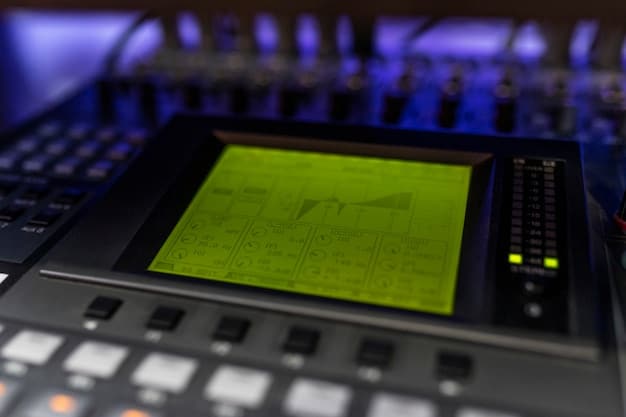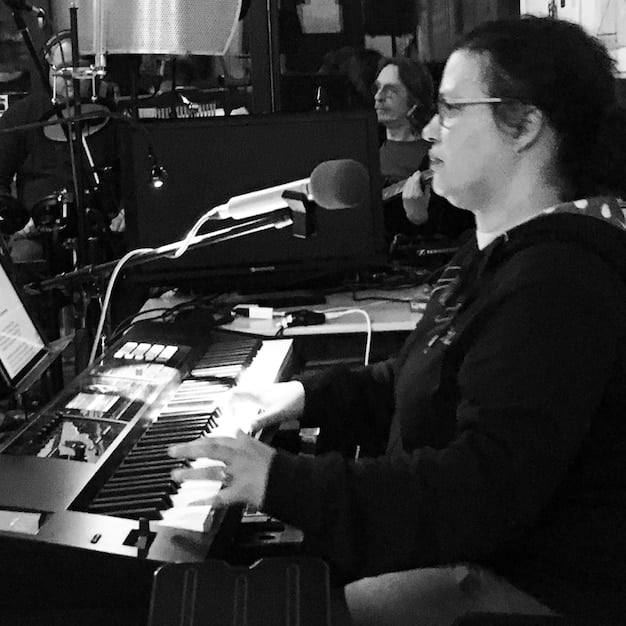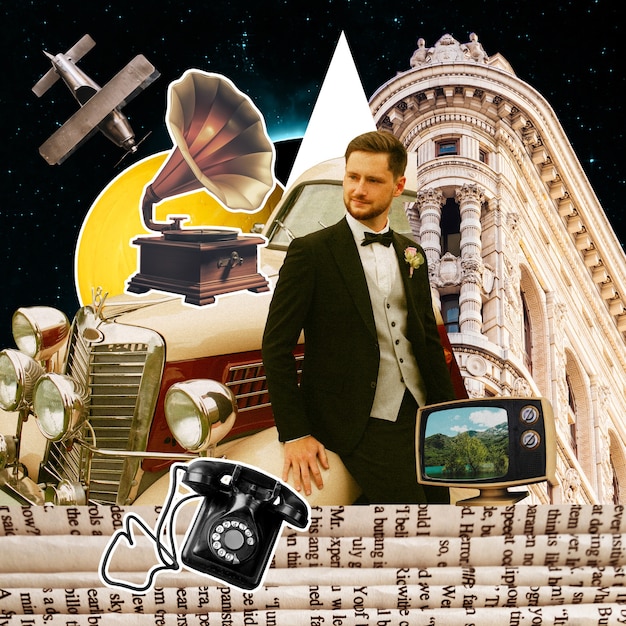The Music of: Exploring Soundtracks and Scores in TV Series

The Music of television series plays a crucial role in enhancing the narrative, creating emotional depth, and distinguishing memorable moments, significantly impacting viewer engagement and overall series success.
The world of television has been revolutionized by the art of storytelling, and a significant component of this art is the music of the screen. From background scores to iconic theme songs, music shapes the way we experience our favorite series, adding layers of depth, emotion, and memorability. It’s more than just background noise; it’s an integral part of the storytelling process.
Understanding the Role of Music in Television
Music in television isn’t merely an afterthought; it’s a deliberate and carefully crafted element that significantly impacts the overall viewing experience. It’s the silent storyteller, capable of conveying emotions, foreshadowing events, and emphasizing crucial moments without uttering a single word.
Enhancing Emotional Impact
One of the primary functions of music in television is to amplify emotions. A well-placed score can turn a touching scene into a tearjerker or elevate a thrilling moment to the edge of your seat. This emotional enhancement is a powerful tool for engaging viewers and making the narrative more compelling.
Creating Atmosphere and Setting
Music also plays a vital role in establishing the atmosphere and setting of a series. The genre of music, the instruments used, and the overall tone can instantly transport viewers to a different time, place, or emotional state, making the story more believable and immersive.

Here are a few ways music contributes to TV series:
- Mood Setting: Music sets the mood, making scenes scarier, happier, or sadder.
- Character Depth: Themes associated with characters enrich the narrative and create deeper connection.
- Building Tension: Music builds tension in suspenseful scenes.
- Creating Identity: Memorable sound tracks define the series and make them famous.
In conclusion, music is indispensable in television since its impact is profound. It heightens emotions, establishes settings, identifies characters and builds tension, creating an immersive experience.
The Power of Theme Songs and Opening Credits
Theme songs and opening credits are the first impression that a television series makes on its audience. They are an opportunity to set the tone, introduce the characters, and provide a glimpse into the world that the series inhabits. A memorable theme song can become synonymous with the show itself, instantly recognizable and evoking strong feelings of nostalgia.
Setting the Tone and Expectations
A theme song should give viewers a sense of what to expect from the series. Is it a lighthearted comedy, a gritty crime drama, or a fantastical adventure? The music, lyrics, and visuals of the opening credits should align with the tone and themes of the show.
Introducing Characters and Storylines
Opening credits often feature quick glimpses of the main characters and hints at the storylines that will unfold. This can be an effective way to introduce the audience to the key players and pique their interest in the narrative. Music helps to tie these visuals together, creating a cohesive and engaging introduction.
Understanding what music brings to the TV shows:
- Defines the show’s identity
- Sets audience’s expectations
- Introduces viewers to the main characters
- Creates connection with viewers
Theme music and the opening credits are extremely important for television shows as they are the first impression and build expectation for the series.
Iconic TV Series Soundtracks and Their Impact
Certain television series have become legendary not only for their compelling storylines and memorable characters but also for their iconic soundtracks. These soundtracks have transcended the shows themselves, becoming beloved pieces of music in their own right. They have the power to transport us back to the world of the series, evoking the same emotions and excitement we felt while watching.

Stranger Things: A Nostalgic Synthwave Score
The soundtrack to “Stranger Things” is a masterclass in nostalgia, evoking the soundscapes of 1980s sci-fi and horror films. The synth-heavy score, composed by Michael Stein and Kyle Dixon, perfectly complements the show’s retro aesthetic and adds a layer of eerie suspense to the supernatural events.
Game of Thrones: Epic Orchestral Arrangements
The “Game of Thrones” soundtrack, composed by Ramin Djawadi, is a grand and sweeping orchestral score that captures the epic scope and dramatic intensity of the series. The music is both beautiful and haunting, reflecting the complex characters and the brutal struggles for power in Westeros. One of these tracks, “The Rains of Castamere,” has become iconic and is often associated with the series.
Examples of iconic television series soundtracks:
- “Miami Vice”: Features original and previously released pop and electronic music bringing the feeling of the 80s.
- “Twin Peaks”: Angelo Badalamenti’s dreamy music creates an atmosphere of suspense and mystery.
- “The Sopranos”: Mixing rock, classical, and Italian folk music showing the variety of the show.
In conclusion, iconic series soundtracks can impact the show itself. They create atmosphere and suspense for the viewer.
The Role of Composers and Music Supervisors
Behind every great television soundtrack are the composers and music supervisors who bring it to life. These talented individuals are responsible for selecting, creating, and implementing the music that enhances the viewing experience. They work closely with the showrunners and directors to ensure that the music aligns with the overall vision of the series.
Composers: Crafting Original Scores
Composers are responsible for creating the original music for a television series. They must have a deep understanding of music theory, orchestration, and film scoring techniques. They work closely with the showrunners and directors to develop a unique musical identity for the series, crafting themes for the characters, storylines, and specific scenes.
Music Supervisors: Selecting and Licensing Music
Music supervisors are responsible for selecting and licensing pre-existing music for a television series. This can involve finding the perfect song to underscore a particular scene, negotiating licensing fees with record labels and publishers, and ensuring that all music is properly cleared for use. Music supervisors must have a broad knowledge of music across various genres and eras.
The relationship between supervisors and composers is key:
- Share creative ideas
- Understand the series
- Work together for the best impact on TV
Composers and supervisors are an integral part for the music of television. This relationship creates music that engages viewers.
The Evolution of Music in TV Series
Music in television series has evolved significantly over the years, reflecting changes in technology, audience preferences, and the overall landscape of the entertainment industry. From basic instrumental themes to the sophistication of contemporary film scores, evolution is constant.
Early Days: Simple Instrumental Themes
In the early days of television, music was often limited to simple instrumental themes and background music. Budgets were tight, and composers were less involved in the creative process. Music was primarily functional, serving to fill the gaps between dialogue and provide a basic sense of atmosphere.
Modern Era: Sophisticated Film Scores
Today, music in television has become much more sophisticated and integral to the storytelling process. Budgets have increased, and composers are given greater creative freedom. They often work with large orchestras and utilize cutting-edge technology to create complex and emotionally resonant scores that rival those of feature films.
The history of music in television shows:
- Early television music often involved of live orchestras.
- Music styles became more diverse with the popularization of new genres of music.
- The integration of music with character development happened later as the shows progressed.
In conclusion, evolution in music television shows is constant, with creativity and resources being on a continuous rise.
The Future Trends in TV Series Music
As the television industry continues to evolve, so too will the music that accompanies it. Composers, supervisors and technology push new boundaries that increase creativity and connection with viewers. To explore future trends is to speculate on where those boundaries will be pushed.
Immersive Sound Experiences
With the rise of immersive audio technologies such as Dolby Atmos and DTS:X, viewers can expect to experience music in television series in a whole new way. These technologies allow composers to create multi-dimensional soundscapes that surround the listener, drawing them even deeper into the world of the series.
Interactive Music and Gaming
As the lines between television and gaming continue to blur, we may see the emergence of interactive music that responds to the viewer’s choices and actions. This could involve music that changes in real-time based on the character’s emotions or the player’s decisions, creating a truly personalized and immersive experience.
Future trends of television music shows:
- More interactive music experiences
- Integration of virtual reality components
- More personalized music shows according to viewers
In conclusion, future trend in television series music is more interactive music that creates engaging sounds for viewers.
| Key Point | Brief Description |
|---|---|
| 🎶 Emotional Impact | Music enriches feelings in scenes creating an immersive viewing experience. |
| 🎵 Themed Music | Sets the show’s identity defines expectations for viewers of the show. |
| 🎼 Composers Influence | Composers and supervisors work together to make music engaging and fitting for the television series. |
| 🎧 Evolving Music | Music in television has been evolving and is continuously improving due to increased creativity . |
What is the role of music in TV series?
The role of music in TV series is to enhance emotions, create atmosphere, and define the series’ tone. It adds depth to the narrative and makes scenes more memorable.
A TV series soundtrack becomes iconic when it successfully captures and enhances the show’s theme, generates strong emotional resonance, and remains memorable over time due to its unique musical style.
The responsibility for the music in a TV series typically rests with the composer and the music supervisor. Composers create the original scores, while music supervisors select and license existing music.
Music in TV series has evolved from simple instrumental themes in early television to complex and sophisticated film scores today, reflecting advancements in technology and more incorporation of diverse musical styles.
Future trends in TV series music may include immersive sound experiences with technology such as Dolby Atmos, interactive music that responds to viewer choices, and integration with VR.
Television music is an ever-evolving and powerful means of communicating with viewers. Emotion, setting and theme development all depend on music to increase the viewing experience.





